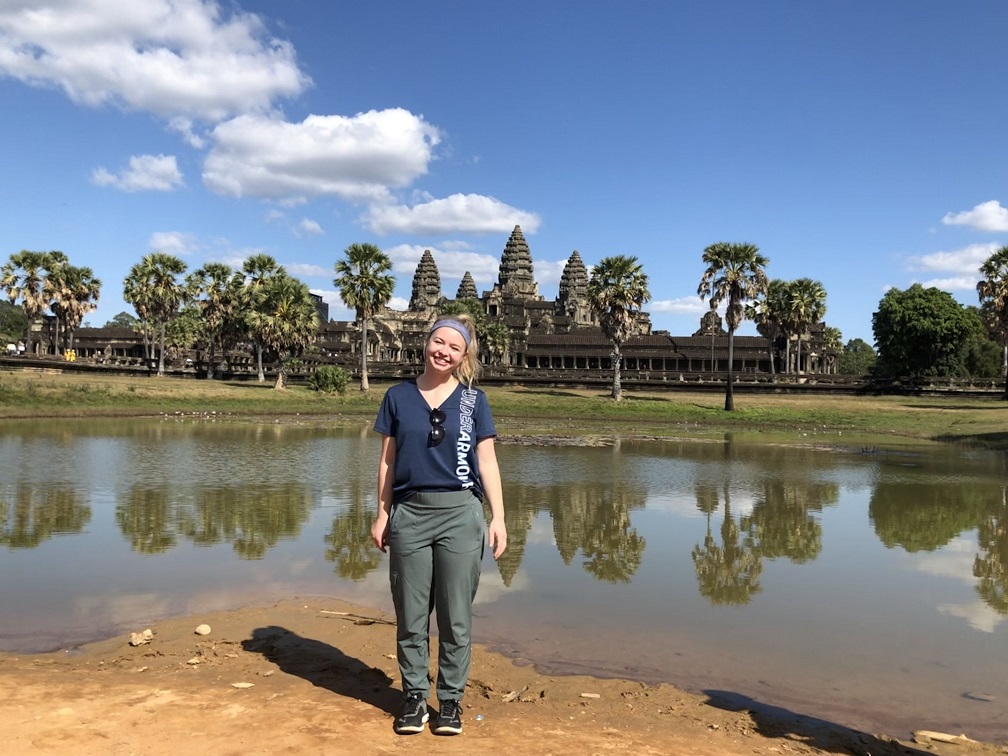Animal sciences graduate student pursues interdisciplinary research
Categorizing Purdue University animal science graduate student Leah Thompson is a challenging proposition.
“I joke that I'm grossly mislabeled, because I'm an animal scientist working on a project in Cambodia that is all about vegetables,” she says.
Furthermore, her role in that project largely focuses on understanding women’s roles, knowledge and attitudes about food safety. This pivot was spurred by an offer from Purdue Professor of Animal Sciences—and her former undergraduate advisor—Paul Ebner to return to Purdue to pursue a Ph.D. focused on international food safety research and outreach. Ebner had recently been named co-Principal Investigator (PI) on a project funded by the Feed the Future Innovation Lab for Food Safety (FSIL) to reduce foodborne illness spread by vegetables sold through traditional markets in Cambodia.
“In Cambodia, we quickly realized that women are involved in every step of the value chain in informal vegetable markets,” says Thompson. “If we want to improve food safety, there is a common denominator here: We must get women on board and work with them. And not only work with them—make sure that women have the capital and the access to make a difference.”
With that motivation, Thompson sought ways to strengthen her academic background in gender studies. Classes offered by Women’s, Gender, and Sexuality Studies in Purdue’s College of Liberal Arts enabled her to build a knowledge framework for the research.
“It’s exposed me to a lot that I would have missed had I approached gender studies strictly through the lens of agriculture,” says Thompson. “I've gained a more holistic understanding of gender studies and feminist studies. It’s made me a huge proponent of interdisciplinary work.”

Thompson has put that knowledge to use, co-teaching two courses on social science research methods—including gender-sensitive surveys, interviews, and focus groups—with project leaders at Purdue and Cambodia’s Royal University of Agriculture. This summer, she and Sreymom Sieng, the in-country gender and youth coordinator, enlisted some of their Cambodian students to help conduct interviews to understand women’s access to resources and power in food safety decision making.
“The end goal is to create interventions to reduce foodborne illness,” says Thompson. “To build effective tools, we need to know what aspects of food production women are involved in and their attitudes about food safety, so that outreach is appropriately targeted.”
Developing tools for outreach is one of her passions. However, despite deep roots in agriculture—she’s from a fourth-generation farming family—she credits international education experiences through Purdue with igniting this interest in outreach and extension. As an undergraduate animal science major, Thompson spent a semester in Wales through a program offered by Purdue’s International Programs in Agriculture, and participated in an animal sciences service-learning course in Romania.
“Study abroad changed my life,” said Thompson. “It really got me hooked on the idea of extension work, that combination of working with people but also having the science as well,” says Thompson.
Her experience with global outreach goes beyond the Cambodia project: She is also developing a food safety module for a new national center for nutrition in Laos in a project led by Gerald Shively, Associate Dean and Director of International Programs in Agriculture at Purdue. This “train-the-trainer” program will empower people to become peer nutrition educators.
Ultimately, she hopes outreach informed by what she terms this “middle ground” at the intersection of agricultural science, social science, and gender studies will drive changes in community nutrition.
“Information is key to helping people understand why things like handwashing before handling food is important,” Thompson says. “Outreach is about making connections among information, nutrition, and food safety. To do that well, you have to understand the role gender plays in the food system and international development.”
About Feed the Future: Feed the Future is the U.S. Government’s global hunger and food security initiative. With a focus on smallholder farmers, particularly women, Feed the Future supports partner countries in developing their agriculture sectors to spur economic growth and trade that increases incomes and reduces hunger, poverty and undernutrition. For more information, visit www.feedthefuture.gov.






